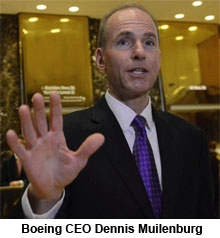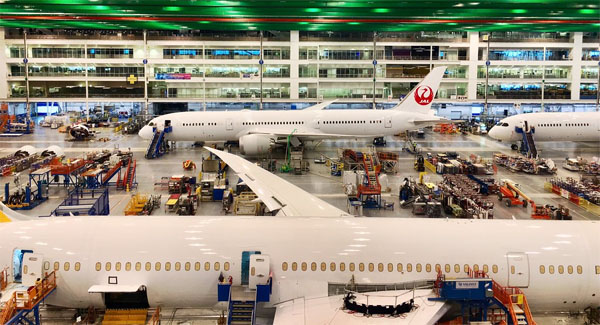NATIONAL
Congress hits Boeing on firing of South Carolina unionists
 WASHINGTON, D.C. (May 24, 2019) — More than 70 members of Congress have written Boeing CEO Dennis Muilenburg seeking information regarding reports of retaliation against six union organizers at the company’s South Carolina facility late last year. According to the reports, it appears that Boeing may have wielded its authority as a “self-regulator” to improperly dismiss three inspection employees.
WASHINGTON, D.C. (May 24, 2019) — More than 70 members of Congress have written Boeing CEO Dennis Muilenburg seeking information regarding reports of retaliation against six union organizers at the company’s South Carolina facility late last year. According to the reports, it appears that Boeing may have wielded its authority as a “self-regulator” to improperly dismiss three inspection employees.
Flight-readiness technicians and inspectors at Boeing’s factory in North Charleston, S.C., voted overwhelmingly in favor of forming a union with the International Association of Machinists and Aerospace Workers (IAMAW) on May 31, 2018. However, Boeing has refused to recognize the union or bargain with those workers for fair pay and a safer workplace.
In the letter sent to Muilenburg this week, members of Congress express concern with Boeing’s refusal to bargain with these employees and dissatisfaction with the company’s excuse for firing the union supporters. According to reports, Boeing claims the fired workers missed a bird strike that caused engine damage. The Federal Aviation Administration (FAA) subsequently supported that fired workers’ claims that there was no such bird strike.
The letter comes amid increased Congressional scrutiny of Boeing and the FAA’s role in the crashes of 737 MAX airliners in Ethiopia and Indonesia that killed everyone aboard.
“Given the ongoing concerns in Congress with Boeing’s ‘self-regulation’ with regards to safety, we are especially troubled by the impression in this case that Boeing may be wielding serious aviation security procedures as retaliatory tools against its own front-line inspection employees,” the letter reads.
The May 22 letter sent to Muilenburg is signed by 73 members of Congress. Rep. Pramila Jayapal (D-WA-7th) was the only member of Washington state’s delegation who signed it.
The letter reads:
Dr. Dennis Muilenburg:
A group of workers at Boeing’s South Carolina facility voted overwhelmingly in favor of unionizing with the International Association of Machinists and Aerospace Workers (lAMAW) on May 31st, 2018 — nearly a year ago. As policy makers, many of us have already expressed concern in a previous letter about your company’s ongoing refusal to recognize the union in South Carolina, and we write now because we are disappointed to learn that Boeing discharged six union supporters shortly before the holiday season last year. We are unsatisfied with the explanations these workers were given from Boeing for their dismissal, as well as the continued refusal to bargain with the lAMAW.
We understand that three of the terminated employees were allegedly discharged for missing a bird strike on an airplane engine in a post-flight inspection, even though the Federal Aviation Administration (FAA) subsequently supported the fired inspectors’ claims that there was no engine damage and no indication of a bird ingestion in the engine core consistent with a bird strike that would cause detriment to the airworthiness of the aircraft. Given the ongoing concerns in Congress with Boeing’s “self-regulation” with regards to safety, we are especially troubled by the impression in this case that Boeing may be wielding serious aviation security procedures as retaliatory tools against its own front-line inspection employees.
Pursuant to Congress’s oversight of the FAA, we request that your company provide the following information:
• How does your company account for the discrepancy between its findings and those of the FAA regarding the alleged bird strike incident that led to the termination of three Boeing employees?
• How did your company decide to terminate the three employees mentioned above and did it revisit the decision in light of the FAA’s subsequent investigation?
• Were the terminated employees given a chance to appeal their dismissal following the FAA investigation that found no impropriety in the inspection?
• Given the important role unions play in ensuring proper workplace procedures and safety guidelines, what steps has your company taken to ensure timely recognition of unions that form at one of your facilities?
We look forward to your responses to these questions. In the meantime, we urge Boeing to immediately recognize the union that your workers voted to form almost a year ago and come to the bargaining table for good-faith negotiations.






